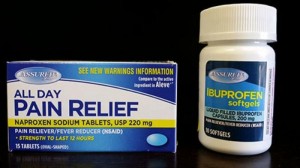By Mark Huffman
When pain strikes, what do you reach for? It can be confusing to walk up and down the pain reliever aisle at the drug store, according to Huffman’s Consumer Affairs report.
 We’ve all heard of the brands through advertising, but what is in them and what do they do? Dr. David Maine, Director of The Center for Interventional Pain Medicine at Mercy Medical Center in Baltimore, gets these questions all the time.
We’ve all heard of the brands through advertising, but what is in them and what do they do? Dr. David Maine, Director of The Center for Interventional Pain Medicine at Mercy Medical Center in Baltimore, gets these questions all the time.
Maine says there are two common types of pain relievers that get the most use today. One is ibuprofen and the other is acetaminophen. The two drugs, he says, are very different.
Of course, you don’t go to the drug store to pick up a bottle of acetaminophen. Instead, you reach for the brand name product, Tylenol. Tylenol is what you take when you have a headaches and Maine says it is also used to treat pain in children.
On the other hand, if you have an aching back, you might reach for a drug containing ibuprofen, like Advil. Ibuprofen drugs attack inflamation in the body.
Potential side effects
Both ibuprofen and acetaminophin are effective against pain, but both come with potential side effects.
“I don’t think there’s a specific medication when you think about Tylenol or non-steroidals such as ibuprofen that one is necessarily safer than the other,” Maine said in a release. “I think ibuprofen and non-steroidals in general are more effective for treating pain conditions, but safety lies in how you’re taking the medication and dose and they can both cause significant problems if taken excessively in doses that are not recommended.”
Common ibuprofen side effects may include upset stomach, mild heartburn, nausea, vomiting, bloating, gas, diarrhea, constipation, dizziness, headache, nervousness, mild itching or rash, or ringing in your ears.
Ibuprofen can also be problematic for people with heart conditions, since it can increase your risk of fatal heart attack or stroke, especially if you use it long term, take high doses, or if you have heart disease.
Easy to overdose
Acetaminophen can be dangerous if you take more than recommended, and that’s easy to do because it’s in so many other drug products you might be taking at the same time.
In 2013, the Food and Drug Administration (FDA) warned that acetaminophen could cause serious skin reactions, a danger that was already described in product labeling.
It is a good idea to discuss both drugs with your doctor if you are taking more than just an occasional tablet. Even though they are sold over-the-counter, both are powerful pain relievers and might even be substitutes for more powerful opioid painkillers that have the potential to become addictive and be abused.
What about old fashioned aspirin? It is still used to treat mild pain, as well as reducing inflammation and fever. Some doctors have also recommended a daily low dose of the drug to prevent heart attacks.
Maine stresses that if you are already taking pain medication, be wary of combination drugs, like cold medications, that can may contain painkillers, so you don’t take too much.

